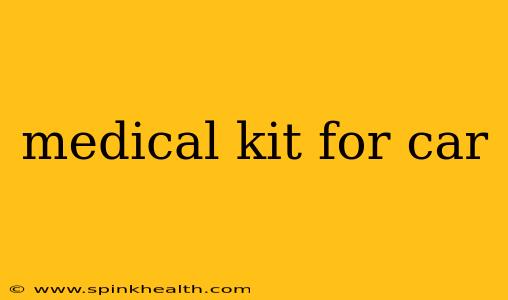Let's be honest, nobody wants to think about car accidents or medical emergencies. But being prepared can make all the difference between a minor inconvenience and a major crisis. This isn't just about a Band-Aid and some antiseptic wipes; we're talking about creating a comprehensive car medical kit that gives you peace of mind on every journey. This guide will walk you through assembling the perfect kit, addressing common questions and concerns along the way.
What should be in a basic car first aid kit?
This is where we start building our foundation. Imagine yourself stranded on a lonely highway, a small cut bleeding persistently. You need something more than a simple scrape solution. A basic kit should include:
- Wound cleaning: Antiseptic wipes, sterile gauze pads (various sizes), adhesive bandages (assorted sizes), medical tape.
- Pain relief: Over-the-counter pain relievers like ibuprofen or acetaminophen. Consider allergy medication if anyone in your vehicle has allergies.
- Infection prevention: Antibiotic ointment.
- Splinting materials: Triangular bandages or even sturdy cloth strips can be invaluable for stabilizing injuries.
What are the essential items for a complete car medical kit?
We're taking it up a notch now. A basic kit is a good start, but a comprehensive kit anticipates a wider range of potential scenarios. Think beyond minor scrapes and bruises.
- Advanced wound care: Sterile gloves, scissors, tweezers (for removing splinters or foreign objects), a CPR face shield (crucial for hygiene during emergencies).
- Allergy treatment: If anyone in your car has severe allergies (like to bee stings), include an EpiPen or similar auto-injector. Remember, this requires proper training in use.
- Emergency blanket: Provides warmth in cold conditions.
- First-aid manual: A small, concise guide can be helpful in stressful situations.
- Flashlight: Essential for night-time emergencies.
- Whistle: To signal for help.
- Emergency contact information: Keep a list of emergency numbers readily accessible, including local emergency services and your personal physician.
What kind of medical supplies should I keep in my car for a long road trip?
Long road trips inherently increase the risk of incidents. The essentials from the previous sections are even more critical, plus:
- Larger quantities of everything: You’ll want more bandages, pain relievers, and antiseptic wipes.
- Motion sickness remedies: Dramamine or similar medication.
- Sunscreen and lip balm: Essential for prolonged sun exposure.
- Water bottles: Staying hydrated is key, especially in hot weather.
- Non-perishable snacks: High-energy snacks can provide sustenance until help arrives.
How often should I check and restock my car medical kit?
Regular checks are essential to ensure your kit remains effective. Ideally, you should:
- Inspect your kit every three months: Check for expiration dates on medications and ensure everything is intact and clean.
- Restock as needed: Replace any used items or those nearing their expiration dates.
- Consider your climate: In hot climates, check regularly to prevent heat damage.
Is it necessary to carry prescription medications in my car?
Carrying prescription medications in your car is a personal choice. It's important to weigh the risks and benefits. If you frequently travel, having a small supply of essential medications on hand might be prudent. But, remember that extreme temperatures can affect the efficacy of some medications.
Where is the best place to store a car medical kit?
Choose a location that’s easily accessible but protected from extreme temperatures and moisture. The glove compartment or a sturdy bag in the backseat are common choices. Avoid storing it in the trunk, as it might be difficult to access in an emergency.
How can I make sure my car medical kit is always ready?
Treat the assembly and maintenance of your car medical kit as a proactive process, not a one-time chore. Make it a habit to check and restock it regularly. Consider keeping a checklist to ensure you don't miss anything. Remember, your preparedness can make all the difference.
Remember, this information is for guidance only and doesn't replace professional medical advice. Always consult with a healthcare professional for specific medical concerns. Your safety and well-being on the road depend on your preparedness. So, take the time to build a comprehensive car medical kit and travel with confidence.

